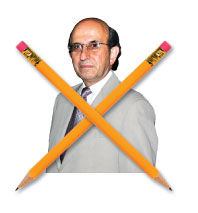
Earlier this month, New York Schools Chancellor Joel Klein, once a star White House litigator, thought he had presented a solid case before the State Legislature. He pointed to small gains in graduation rates, a spike in fourth- and eighth-grade math proficiency, and signs of a narrowing gap in achievement among the races. Then he said, “There is a lot more work to do.”
But he may not be the one to do it. The seven-year “experiment” in mayoral control of the schools comes up for renewal this June, and legislative approval of its continuation might come at the price of the chancellor’s job. The day of the hearing, the lawmakers let their feelings toward Klein be known in no uncertain terms. (“Hogwash! … Your superintendents control nothing,” declared one assemblyman. “We have no choices. We’re overcrowded,” said another. “You’re violating the law,” squawked a third.) After the hearing, Bloomberg’s lobbyists were overheard bemoaning “how much the legislators hate Klein,” says a City Council member. Klein later dialed lawmakers one by one to calm them down. “There was a feeling it was too little, too late,” says an Assembly source.
Which means Klein’s days as education-reform bad cop might soon be over. Dennis Walcott, the deputy mayor for education, says, “There’s no space between the mayor and chancellor. There’s total alignment. They have honest direct interaction with each other and they will continue to form that strong partnership into the third term, if there is one.” But others aren’t so sure. “There’s no question [the mayor’s] going to get rid of him,” says a City Council member. Bloomberg’s “more convinced than ever that he’s created so many enemies.”
Klein, even more than his aloof boss, was never a particularly charismatic technocrat. He grew up in public housing in Queens, and comes off as a street-tough nerd, with a blunt style and a way of speaking that makes him sound angry even when he’s not. Both he and Bloomberg are self-made sons of bookkeepers, tenacious, restless, corporate-minded, and distrustful of ideology and public-education orthodoxy. Over the years, Klein has also been helpful to the mayor as a target for lawmakers, parents, and teachers. Bloomberg bought peace with the teachers union by increasing teacher pay by more than 30 percent and conveniently left Klein in charge of the bloodier battles over spending, restructuring, teacher firings, and teaching to the standardized tests.
Which means that the problem for Klein is not so much in the data (though critics have accused him of juicing the numbers) but himself. This is a big problem for Bloomberg’s dreams of a third term as “education mayor.” He can’t pay off the United Federation of Teachers, which sat on the sidelines last election, with a better contract this time. “If the UFT decides, based on Klein, to oppose Bloomberg, you’re talking about a lot of troops on the ground,” says labor activist Jonathan Tasini. Knowing this, the union is said to be pushing the mayor to sacrifice Klein. While lawmakers have piled on the chancellor, UFT head Randi Weingarten has restrained her attacks in recent weeks, stirring speculation of a pact with Bloomberg. Walcott says, “The mayor is not one to make deals for anything that sacrifices individuals.” But on the question of Klein’s fate, Weingarten answers gamely: “I’ve found the mayor easier to deal with and more responsive than the chancellor.”
Have good intel? Send tips to intel@nymag.com.